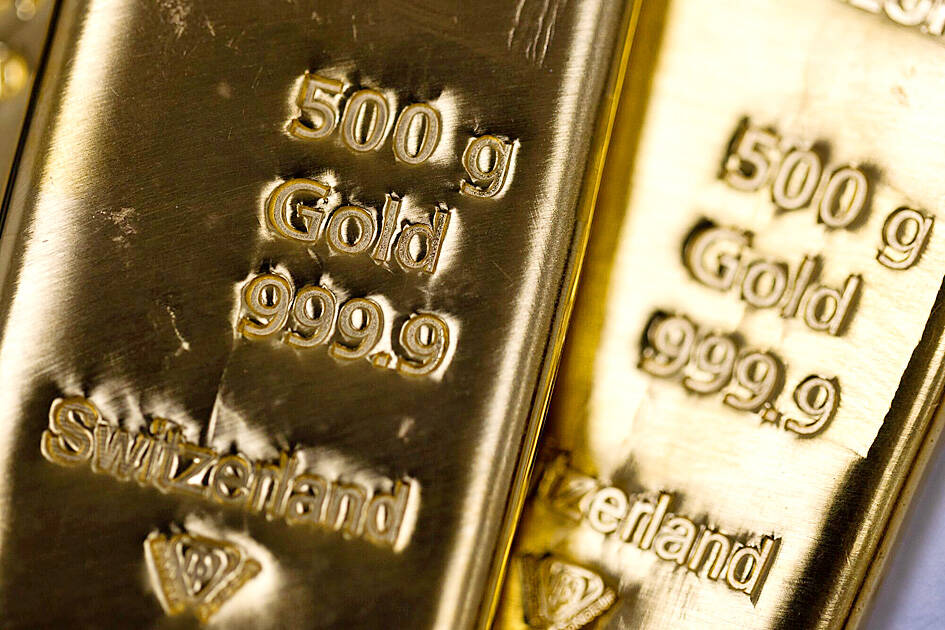Gold prices reached a record high yesterday, with safe-haven demand continuing to support prices as traders monitored escalating tensions in the Middle East and the increasingly tight US presidential election race.
Bullion climbed to an all-time high of about US$2,732.82 an ounce, topping last week’s peak by a few dollars. The bullish sentiment has also spilled over to silver, which was trading at the highest since 2012, while palladium and platinum also rose.
Meanwhile, oil prices edged higher following a more than 7 percent drop last week, with Brent crude futures up 1 percent at US$73.76 a barrel, and US West Texas Intermediate crude futures up 1.17 percent to US$70.74 a barrel.

Photo: Bloomberg
Markets are focused on geopolitical risks in the Middle East, with Israel discussing its next attack on Iran after a Hezbollah drone exploded next to Israeli Prime Minister Benjamin Netanyahu’s private home on Saturday.
US President Joe Biden and his administration have urged the renewal of ceasefire negotiations in the region, although Israeli hardliners oppose concessions.
Traders were also repositioning portfolios ahead of the US election on Nov. 5.
Polls show the contest between former US president Donald Trump and US Vice President Kamala Harris could be the closest in a generation. Investors typically seek safety in gold in times of geopolitical and economic uncertainty.
Gold futures might rise to average US$3,000 an ounce in the fourth quarter of next year, Commonwealth Bank of Australia analyst Vivek Dhar said in a note on Monday.
The US Federal Reserve’s rate-cutting cycle would likely drive weakness in the US dollar, he added. A lower greenback makes bullion cheaper for many buyers, as it is priced in the US currency.
Bullion is one of this year’s strongest performing commodities, with gains of more than 30 percent so far this year. Rate-cut optimism fueled the most recent advances as the Fed kicked off its easing cycle last month. Robust central bank buying has also been a long-standing pillar of support for gold prices.

The DBS Foundation yesterday announced the launch of two flagship programs, “Silver Motion” and “Happier Caregiver, Healthier Seniors,” in partnership with CCILU Ltd, Hondao Senior Citizens’ Welfare Foundation and the Garden of Hope Foundation to help Taiwan face the challenges of a rapidly aging population. The foundation said it would invest S$4.91 million (US$3.8 million) over three years to foster inclusion and resilience in an aging society. “Aging may bring challenges, but it also brings opportunities. With many Asian markets rapidly becoming super-aged, the DBS Foundation is working with a regional ecosystem of like-minded partners across the private, public and people sectors

Taiwan Semiconductor Manufacturing Co (TSMC, 台積電) has secured three construction permits for its plan to build a state-of-the-art A14 wafer fab in Taichung, and is likely to start construction soon, the Central Taiwan Science Park Bureau said yesterday. Speaking with CNA, Wang Chun-chieh (王俊傑), deputy director general of the science park bureau, said the world’s largest contract chipmaker has received three construction permits — one to build a fab to roll out sophisticated chips, another to build a central utility plant to provide water and electricity for the facility and the other to build three office buildings. With the three permits, TSMC

BREAKTHROUGH TECH: Powertech expects its fan-out PLP system to become mainstream, saying it can offer three-times greater production throughput Chip packaging service provider Powertech Technology Inc (力成科技) plans to more than double its capital expenditures next year to more than NT$40 billion (US$1.31 billion) as demand for its new panel-level packaging (PLP) technology, primarily used in chips for artificial intelligence (AI) applications, has greatly exceeded what it can supply. A significant portion of the budget, about US$1 billion, would be earmarked for fan-out PLP technology, Powertech told investors yesterday. Its heavy investment in fan-out PLP technology over the past 10 years is expected to bear fruit in 2027 after the technology enters volume production, it said, adding that the tech would

RUN IT BACK: A succesful first project working with hyperscalers to design chips encouraged MediaTek to start a second project, aiming to hit stride in 2028 MediaTek Inc (聯發科), the world’s biggest smartphone chip supplier, yesterday said it is engaging a second hyperscaler to help design artificial intelligence (AI) accelerators used in data centers following a similar project expected to generate revenue streams soon. The first AI accelerator project is to bring in US$1 billion revenue next year and several billion US dollars more in 2027, MediaTek chief executive officer Rick Tsai (蔡力行) told a virtual investor conference yesterday. The second AI accelerator project is expected to contribute to revenue beginning in 2028, Tsai said. MediaTek yesterday raised its revenue forecast for the global AI accelerator used